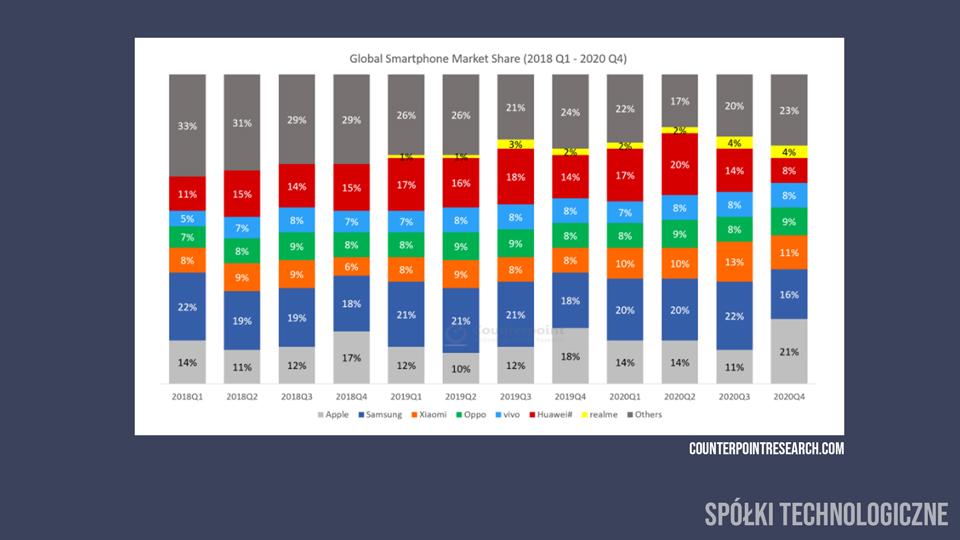Once, mobile phones were used only for calling or sending text messages. Once undemanding meetings with the charger for several days, armored devices are often not so durable today, but they allow us to do much more than just talk. So let's check whether the shares of smartphone manufacturers are a good proposition for our portfolios.
Once again we see each other as part of the cycle about technology companies,
whose partner is eToro. I don't know if there will be one person among you who is not addicted to his smartphone to some extent. Whether we like it or not, these devices have become a part of our lives - we use them to browse the time-consuming gray cells of social media, but also to check company charts or make transactions on financial markets.
According to statistics, about one and a half billion of these devices are sold to end users worldwide every year. In 2020, we see a small deviation, because "only" 1.38 billion smartphones were sold. The value of the market in 2020 was estimated at about USD 715 billion, and in 2026 it is expected to amount to as much as USD 1,351 billion.
History
According to the encyclopedic definition, a smartphone is a portable, multimedia device that combines the functions of a mobile phone and a laptop computer. The first device of this type was created in 1992 and looked more like a wireless landline phone crossed with a calculator than a groundbreaking device, but as we know, Krakow was not built in a day. IBM Simon Personal Communicator, or simply IBM Simon, as this breakthrough invention was called, was a mobile phone with a monochrome touch screen. In addition to making calls, it also allowed you to receive faxes, e-mails, and use the calendar or calculator. A stylus was required to operate it.
Current market division
Today, fortunately, we do not have to limit our choice to one company. When we look at the quarterly breakdown of the market by individual manufacturers in 2018-2020, it is very clear. 2018 and 2019 undoubtedly belonged to Apple. The share of the iPhone ranged between 25 and 30%. However, in the second quarter of 2019, phones with a bitten apple had to give way to Huawei and Samsung - both of these companies took 20% each.
Apple
Many people will think of the iPhone when they hear the word "smartphone". Because even though such devices existed before, it was the American company from Cupertino that popularized these multimedia combines. The first iPhone was released on January 9, 2007. It supported EDGE data transmission based on the 2G network - 3G appeared only in the third generation. The first generation was sold only in a set with a two-year contract with one of the operators - however, this did not discourage customers who flocked to the showrooms.
In total, Apple sold over 6 million units of its first phone
For comparison, it is worth mentioning that in 2020 Apple sold over 235 million of its phones, and the year before 219 million. Quite a leap, right? If we are considering joining Apple, we must remember that they do not only manufacture phones. They also create software adapted to their smartphones and computers, and produce these computers. iPhone sales account for about 45% of Apple's revenue.
Samsung

Since we talked about Apple, we also need to look at the other strong player whose shares can go to your wallets. I mean, of course, the Korean giant, which is Samsung. This one, like Apple, does not only create and sell smartphones. Its offer, as you probably know, is very rich - the Samsung logo can be seen on TV sets, washing machines, laptops, smart home products and many others. As we already know, Samsung's share of the smartphone market is significant. It is hard to find exact data on what percentage of Samsung's budget are smartphones - but if you trust Forbes, the IT&Mobile Communications segment provided about 43% of the company's revenue in 2019. In the same year, Samsung sold approximately 296 million phones.
You have to remember
IT&Mobile Communicationsthat while the price threshold for Apple smartphones is quite high, Samsung offers, in addition to equally expensive flagships, also more affordable phones. In addition, Samsung is also responsible for supplying components for third-party phones. If you x-ray your iPhones, there is a high probability that you will find Samsung parts there.
Xiaomi
After Apple and Samsung, there is also another large manufacturer to look at. Many of you will probably say that neither the iPhone nor the Galaxy is for you, because Xiaomi is better. So is it worth considering buying shares of the Chinese giant? If we look at the sales results, it is slightly weaker than its predecessors, but we are still talking about a significant market position.
In 2019, Chinese phones sold over 126 million units
Here, too, we are dealing with a company that, apart from phones, has a rich product portfolio, such as the popular mi band sports bands or equipment smart home. In 2019, smartphones accounted for about 59% of Xiaomi's business. The success of the company's products can be determined not only by the technologies used in them, but also by the price-quality ratio, which, according to Xiaomi fans, is at a favorable level. And indeed, their products are clearly cheaper than those with a bitten apple in the logo.
iOS vs. Android
In order for our phones to work and allow us to use our favorite features, of course, software is also necessary. No one will be surprised by the fact that at the moment the most popular operating system for such devices is Android, which has captured as much as 87% of the market. So Apple's iOS has only 13 of them. However, there are many voices that it's not about quantity, but about quality. After all, Android is a very universal system that can be used by almost any portable device. However, iOS created by Apple is adapted to work only with iPhones, thanks to which its creators can make the most of both hardware and software.
Polish player - Maxcom
You must remember, however, that it is not important for everyone what clock speed the smartphone's processor works with or how many giga ram we can have in it. There is no shortage of people for whom it is important only that the phone works and allows you to call loved ones. And such recipients are reached by the Polish Maxcom listed on the Warsaw Stock Exchange. This company was established in 2001 and in the early years of its activity it was engaged in the sale of landline telephones and other telecommunications equipment. Then, the offer was extended to include telephones for seniors - both landline and mobile.
The mobile phones produced by Maxcom are very simple and easy-to-use devices,
providing access to the most important functions in such a way that anyone can handle them. The company cooperates with mobile network operators both in Poland and abroad, and since 2018 it has also been a distributor of Meizu smartphones in Poland.
Challenges and Opportunities
Given how similar all smartphones are today, and how much they already offer, many people may not have a reason to quickly replace such a device. Certainly, a big challenge for their producers is the implementation of such technologies and improvements that the customer really needs to reach for a new phone, thus generating revenue for the company. Of course, there is no shortage of voices, unfortunately often supported by evidence that producers have another way to earn money - we are talking about intentional, premature aging of the product.
Because if the phone works, why replace it?
So you can make it not so user-friendly anymore - so there is no shortage of cases when new software updates strangely slow down older devices. Then we could hear that this is of course for our own good, because thanks to this, the battery will last longer, for example, but many people are not convinced.
Technology enthusiasts, however, can quietly rub their hands
- roll-up or foldable screens are becoming more and more popular, thanks to which phones slightly different from those we are used to appear on the market. The popularization of the 5G network (unfortunately controversial in some circles) is also important. The battery life itself is also an important issue. Of course, phone manufacturers are somewhat limited by the currently available technology, but I myself would gladly pay extra for a smartphone if I was guaranteed that in three years its battery will be as efficient as on the day I take it out of the box. Do you have a similar opinion? Or do you completely disagree with it? What do you think the future of smartphones will be? Let me know in the comments!


